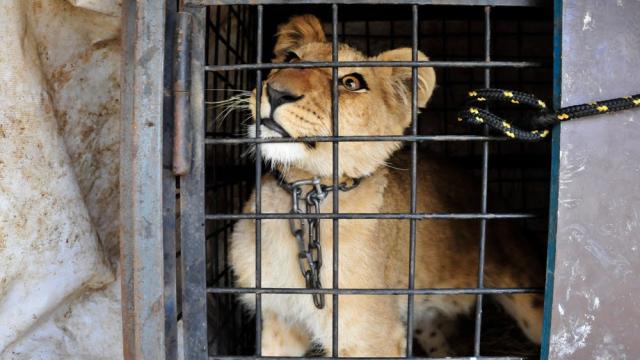
V for Vinegar Movement. Brazilian Spring. The social unrest and demonstrations that shook Brazil during June and July, and continued into August with smaller but persistent aftershocks, have attracted several monikers that added a touch of humor to them. The unprecedented protest wave caught politicians, right and left, by surprise and left them not quite sure how to respond to this movement without leaders, fueled by social media networks, which prompted millions to take to the streets to protest systemic corruption and ramshackle public services.
Bus fare hikes in Sao Paulo were the catalyst, but a lesser known movement has also emerged from the widespread, deep-seated discontent about Brazil's corruption, rigged political and justice systems, and the failure to punish crimes: the animal advocacy movement.
On August 18, Brazilians across 216 cities took part in a nationally coordinated effort known as Crueldade Nunca Mais (No More Cruelty), which brought together a coalition of organizations from welfarist heavy-weights like the World Society for the Protection of Animals to vegan activists like Guia Vegano.
Crueldade Nunca Mais started in 2012 in response to the killing of Lobo in the city of Piracicaba, Sao Paulo State. The case of the dog dragged to death by his owner became national news but, despite the outcry, Cláudio César Messias received only a small fine and a suspended six-month sentence. Even though the penalty was symbolic, some people celebrated that the trial resulted in some kind of punishment.
Like corrupt politicians who hardly ever land in jail even when they're publicly unmasked, animal abusers in Brazil rarely get caught and when they do, they're let off with a slap on the wrist. One of the reasons is the outmoded legislation that does not reflect the country’s shifting moral compass towards non-humans. But perhaps as a sign of economic and cultural development, Brazil has seen a rapid rise in the animal advocacy movement, also largely thanks to social networks.
Crime and a Lack of Punishment
Animal cruelty is a widespread problem in Latin America's largest nation. Overworked and underfed horses and mules collapse dead around the country on a daily basis. An epidemic of pet abandon has left 30 million dogs homeless and vulnerable to all types of abuse in addition to hunger and disease. Wildlife trafficking forcefully removes 30 million individual animals from their habitats every year, with 90 percent dying from the stress of being captured. More than half of the meat consumed in Brazil comes from illegal slaughterhouses where animals are dispatched gruesomely. Everywhere in the country, animals are suffering.
Crueldade Nunca Mais demands that harsher penalties against animal cruelty be written into Brazil's new criminal code, which is currently undergoing revision to equip police with a better legal apparatus to press for charges. “I believe prison and higher penalties prevent criminal acts. The lack of punishment ends up stimulating crime,” says journalist Silvana Andrade, who is the founder of ANDA, Brazil’s largest animal rights news portal, which attracts over 1 million visitors per month.
“There will always be psychopaths, but there are also plenty of opportunists," she adds. "For the latter, prison and fines for animal abuse can make them think before acting.”
Andrade’s opinion is echoed by George Guimarães, head of the vegan activist group VEDDAS. “Harsher penalties can have a long-term impact on a number of criminals, especially the ones with a sense of consequence,” says Guimarães. He notes, however, that “the most efficient measure is to raise people’s awareness in relation to the issue, so that the general public perceives mistreating animals as something reprehensible.”
The Crueldade Nunca Mais movement's petition has been signed by more than 200,000 people and attracted support from a string of TV celebrities starring in Brazil’s soap operas, the local version of Hollywood fame. Household names such as Sabrina Kato, Giovanna Ewbank and Guilherme Boury appeared in promo videos in the build-up to last Sunday's street protest.
This summer showed that Brazilians have developed a taste for protest and occupation as well as the awareness that in order to change the country for the better, they need to roll up their sleeves and act. Rio de Janeiro in particular is demonstrating resilience with constant protests directed at Governor Sergio Cabral for alleged corruption and abuse of power. The city’s assembly was occupied for several days in the first half of August.
Meanwhile, Coco Park in the northeastern city of Fortaleza has been uninterruptedly occupied for more than 40 days. Spots of protest are to be found somewhere, everyday, across the country. Protest has become a way of life. The placards and chanting make it clear that what drives it is a vision of a fairer, more ethical and compassionate society.
And the demands translate to better, fairer treatment of Brazil's animals, too.
3 WAYS TO SHOW YOUR SUPPORT
- Log in to post comments















